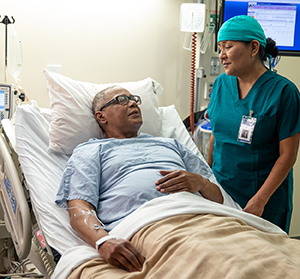Infective endocarditis is an infection of the lining of the heart (endocardium) or the valves of the heart. The infection is most often from some type of bacteria. But other germs can also cause it. It’s most common in men over age 60 who have heart problems.
Types of treatment
You may be treated by a specialist, such as:
-
A heart doctor (cardiologist).
-
A heart surgeon (cardiovascular or thoracic surgeon).
-
An infectious disease specialist.
Treatment may include:
-
A hospital stay. You may be in the hospital for a week or more. You will get I.V. (intravenous) medicine and other care as needed.
-
Antibiotic medicine. This is given in a vein. It's used to treat an infection caused by bacteria. You may need to get I.V. antibiotic medicine at home since treatment may last from 2 to 6 weeks. How long you get antibiotic medicines will depend on how your body responds to the treatment and the type of infection. This will be decided by your care team.
-
Other medicines. Other medicines may be used for an infection from a virus, fungus, or other germs.
-
Surgery. You may have surgery to:
-
Remove infected tissue.
-
Replace a damaged heart valve.
-
Remove or replace a device, such as an infected implanted cardiac device.
-
Remove or replace an indwelling catheter.
-
Possible complications of infective endocarditis
Infective endocarditis is very serious. It can lead to many problems and even death. Possible complications include:
-
Heart valve damage.
-
Inability of the heart to pump well (heart failure).
-
Kidney failure.
-
Spreading of the infection to other areas of the heart or to other parts of the body, such as the lungs or brain.
-
Death.
Blood vessel blockages from pieces of abnormal tissue growth (vegetation) may travel to other areas of the body. These blockages are called emboli. They can cause serious problems wherever they travel. For example:
-
In the brain, they cause a stroke.
-
In the lungs, they cause pulmonary embolism.
-
In the arteries of the heart, they cause a heart attack.
They can also travel to the spleen, bowel, arms, or legs and cause severe problems.
Preventing infective endocarditis
Infective endocarditis can’t always be prevented. But there are some things you can do to reduce your risk. These include:
-
Take very good care of your teeth and gums.
-
See your dentist often for checkups and cleanings.
-
Don't use recreational I.V. drugs.
-
Practice good body hygiene.
-
Take all antibiotics as prescribed for strep throat or other infections.
You may need to take antibiotic medicine before some medical and dental procedures. This is to help prevent endocarditis if you have:
-
An artificial heart valve.
-
A congenital heart defect.
-
Had infectious endocarditis in the past.
Make sure to tell all of your health care providers and dentists about your heart health history.
When to contact your doctor
Contact your health care provider right away if you have:
-
Fever of 100.4°F (38°C) or higher, or as advised by your provider.
-
Night sweats or chills.
-
Unexplained weight loss.
-
Swelling of your feet, legs, or belly (abdomen).
-
Skin changes.
Call 911
Call
-
Trouble breathing
-
Fast, slow, or irregular heart rate
-
Chest pain or pressure, nausea or vomiting, profuse sweating, dizziness, or fainting
-
Sudden numbness or weakness in arms, legs, or face, or difficulty speaking



